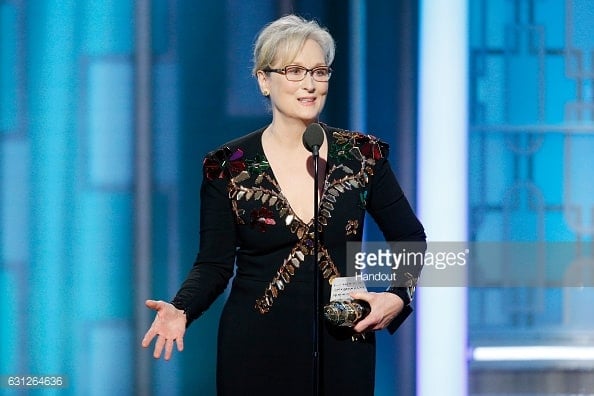Once, sequestered in a Toyota Camry for a long road trip, a few young Jesuits playfully developed a list of people, places, and things universally adored by men in the Society. Inspired by the popular blog Stuff White People Like, entries for the Jesuit version were discussed and vetted.
Topping the list of “Stuff Jesuits Like” was none other than Meryl Streep.
Sunday’s Golden Globes Award Ceremony is not likely to remembered for who won or lost. Instead, it will be remembered for this speech from Streep, who won the Cecil B. DeMille lifetime achievement award:1
The reaction to this speech was swift and powerful. Responses ranged from the adoring:
find someone who looks at you the way literally everyone looks at meryl streep pic.twitter.com/ClnOwFsX02
— keely flaherty (@flahertykeely) January 9, 2017
To the scathing:
Meryl Streep, one of the most over-rated actresses in Hollywood, doesn’t know me but attacked last night at the Golden Globes. She is a…..
— Donald J. Trump (@realDonaldTrump) January 9, 2017
Hillary flunky who lost big. For the 100th time, I never “mocked” a disabled reporter (would never do that) but simply showed him…….
— Donald J. Trump (@realDonaldTrump) January 9, 2017
“groveling” when he totally changed a 16 year old story that he had written in order to make me look bad. Just more very dishonest media!
— Donald J. Trump (@realDonaldTrump) January 9, 2017
Regardless of whether you love Streep’s speech or find it emblematic of everything that’s wrong with Hollywood, the question remains: should you even care what Meryl Streep thinks about politics?
There are certainly reasons to think not. Streep has a Masters in Fine Arts, not Political Science. She is a consensus choice for best American female actor of all time, not a publicly elected official. She is a Hollywood star, not a D.C. expert.
Plus, Streep’s life is nothing like yours. She is a member of the “1 percent.” The fruit of your daily labor goes largely unnoticed. Streep’s is celebrated at a black tie event in front of Hollywood stars. How can she possibly understand the concerns that are relevant to your life?
Still, there is one good reason to listen to Streep. Meryl used her platform and voice2 to express a deep concern for the vulnerable–in this case, a disabled person. She brought the voice of someone without the “privilege, power, and capacity to fight back” to a captive audience of 20 million. Before rolling our eyes at Streep’s as the rantings of another Hollywood elite, we should first applaud her willingness to bring the evening’s conversation, however briefly, to someone on the margins.
Instead of calling out those celebrities who speak up against injustice, we should be critical of those who stay silent.3 More importantly, we should examine our own power and privilege and ask how we are using it on behalf of those who have none. We may not have the resources or platform of a Meryl Streep, but we are not powerless, either. We can keep the worries of the voiceless in mind and amplify them if we get a chance.4
The point is not whether Meryl Streep was right or wrong, whether her speech was beautiful or incoherent. In a night filled with self-concerned blather (look at her dress!?!? Who is his new squeeze!?!?!)5, a small bit of concern for the other broke through. And that is worth recognizing. And even imitating.
- Unless, of course, you’re Pharrell wondering when people will get that not all black movies are the same:
Pharrell’s face just held hundreds of years of whitewashing resolve #HiddenFences #goldenglobes pic.twitter.com/OMAebhPjkb
— Tonja Renée Stidhum (@EmbraceTheJ) January 9, 2017
- And what a voice! Did you see “Into the Woods”? ↩
- The Book of Proverbs does insist that we “Speak out for those who cannot speak, for the rights of all the destitute. Speak out, judge righteously, defend the rights of the poor and needy.” ↩
- Though, if any of you, dear readers, have a bully pulpit or are receiving a lifetime achievement award, feel free to use that too. ↩
- For the record, Emma Stone had the best dress and Amy Schumer the most noteworthy neo-squeeze. ↩


